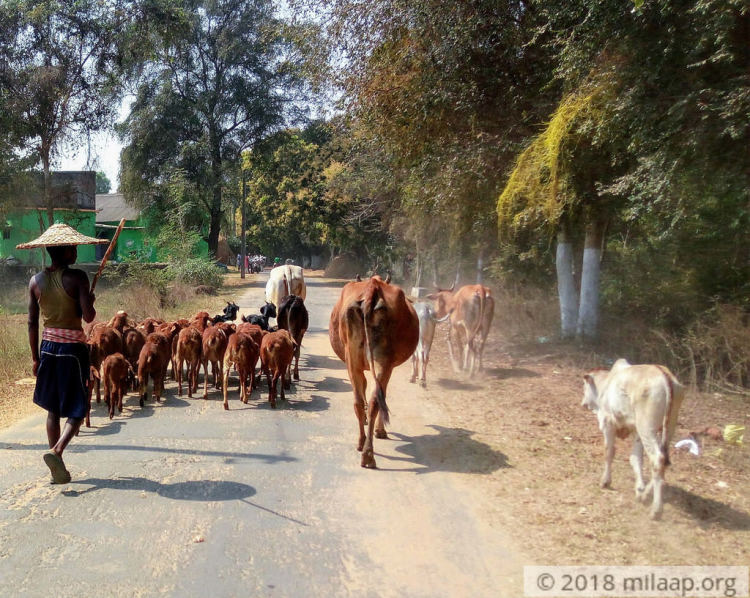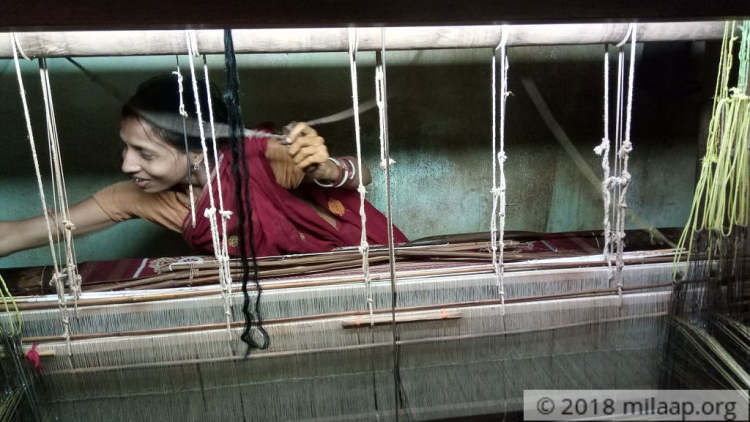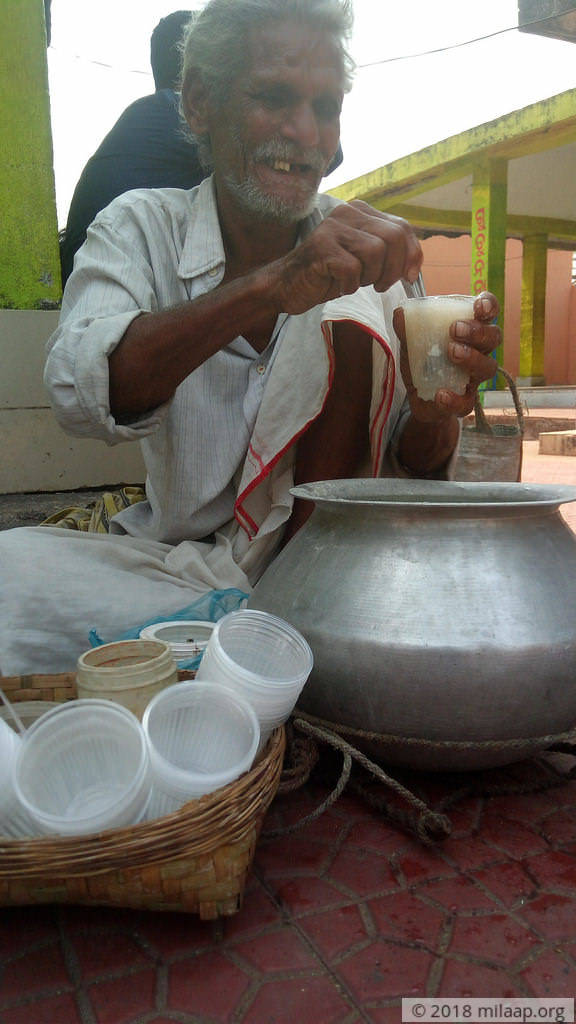It almost took me a while to fathom the dried chest of Mahanadi river as I crossed the elongated 2.5 km long Jatomundia Bridge. Trucks like assorted match boxes lined up to carry sand on their pouches for construction purposes. I could not believe this was the same Mahanadi River that often flashes in the news for its flood wrath. It was the first hour when I stretched a lazy morning to the village of Nuapatna in Odisha. If you open 10 boxes of Camlin and dilute all the “green” crayons I can bet they will collapse to compete with Nuapatna’s fluorescence of greenery, almost pricking your pupils. Narrow serpentine roads accompany huge acres of arid lands. Alternative farming is very much prevalent in this area where if the month of February brings paddy yield, the showering monsoons will call for groundnuts. A typical village scene like we reckon in the short stories of Malgudi Days. The struggle of brother farmers to cultivate before the fervor of sun, half-naked men pivoting the bamboo stick as they guide cattle. My sleep-deprived eyes could see tomatoes, beans and lots and lots of cabbage cultivation. The veggies much be an offering to the tang as workmen stopped to put their bargaining talent at a trial. Freshly plucked from the earth, vegetables advertised by men who never got to enter the market competition. So the ground is their platform and the grasslands their billboards.


 \
\


But even this ignorant village has realized the pennies generated from tourism. The Ansupa Lake which falls on the way has a big gate flaunting its name. The adjacent orchid is crammed with mango trees whose attar must be fuming for miles. This too is now a picnic spot where every group will be bequeathed with one tree for mere INR 100. Being a naive ramble, I chose for a rope-like lane further ahead (left) that demonstrated the complexities of nets and fishes, of fishermen and wooden boats.


As the heart of Nuapatna emanated I was compelled to shift my courtesy to the women. There is a popular concept of working women in the cities but it is comical that this village is economically run as much by the women without the streak of 10 to 5 formal jobs. My first encounter was a weaver who leads a Self Help Group and generates enough income to dare proclaim that she dreams of making her son an Engineer. What can a traditional handloom machine build with the sweat of an elapsed carpenter offer? The merchants provide the thread to these women which is of pure cotton. The women then burn the midnight oil to make sarees and blouses pieces. It takes about 8 long hours to weave a saree which is priced at INR 900 and the labor gets INR 300 out of it. Walking past the lanes of this dainty colony I met several such weavers who took out time to show me their art without anticipating my purchase. Are these performers what we call as fashion designers or their talent is just as trifle as the village.?



Not a single occasion in this country is spared of the sound of crackers. Crackers are synonymous with a celebration. The whole of Purunatigiria area in Nuapatna is dedicated to the women who make this crux of merriment. It is hard-hitting to cognize that once this was a man’s job but over the years the women here have maintained the tradition in the form of their hard work. The cracker-market may be streamed by the Gram Panchayat, but the women are the blue-collar-workers. To assure myself I visited about 8 houses and to my awe in every nest dwells a feminine figure so feeble to avoid the prominence of my camera but sturdy enough to make 50 crackers per day. There is a huge disparity in terms of their earnings and not that these women are ignorant of the fact. Somehow, this never stops them from drudging further for this is not just a commercial act but also maintenance of legacy. Are these the modern women I come across at women empowerment magazines or are they hoodwink stuck with the tradition-frenzy?


A bunch of school girls in uniforms waved at me as they cycled on the pavements. Pushpalata must have gone to school in the same manner. She had the opportunity to study till class 10. Her elaboration of the degree seemed like it was a huge deal to touch the Matric summit. Soon after she was forced into marriage, for it was irrational to wait for the girl to reach a maturity of comprehending the intricacies of holy matrimony. Women, her mother narrated, are born with the apparatus of home-making and child-rearing. When her husband lost his odd job, she decided to run the household without ceasing her daughter’s education. One wooden table displaying few grocery items was her start-up. It has been 8 long years now and Pushpalata now has the biggest departmental store in Nuapatna. From clothes to jewelry, to stationary items, to general items her shop is a rescue for customers as speckled as their demands. Yet this formidable insurgent was humble enough to give me a glass of Limca and Uncle Chips for free. Is Pushpalata eligible for Global Women Entrepreneur Awards or it was just the innate venture of an inexperienced mother?


Her suggestion made me walk barefoot till the Dhabaleshwar Temple. I wanted to perceive where she gets her strength from against my own set of principles. My feet burnt with the ire of the ground. To quench the thirst, I stopped by an eccentric sage to have buttermilk. His passion for playing the flute that possessed his street-vending for 28-years sweetened the sour prick on my buds. Crossing the vexing rush of the Hanging bridge all I could appreciate was the amalgamation of multi-colored temple tomb and clear sky. I realized Pushpalata found peace in the humdrum of her daily wrangles. I hid on the ancient ghat of fallacies for sunset where the resonance of bells repeatedly etched the inspirations I absorbed throughout the day.






 \
\


But even this ignorant village has realized the pennies generated from tourism. The Ansupa Lake which falls on the way has a big gate flaunting its name. The adjacent orchid is crammed with mango trees whose attar must be fuming for miles. This too is now a picnic spot where every group will be bequeathed with one tree for mere INR 100. Being a naive ramble, I chose for a rope-like lane further ahead (left) that demonstrated the complexities of nets and fishes, of fishermen and wooden boats.


As the heart of Nuapatna emanated I was compelled to shift my courtesy to the women. There is a popular concept of working women in the cities but it is comical that this village is economically run as much by the women without the streak of 10 to 5 formal jobs. My first encounter was a weaver who leads a Self Help Group and generates enough income to dare proclaim that she dreams of making her son an Engineer. What can a traditional handloom machine build with the sweat of an elapsed carpenter offer? The merchants provide the thread to these women which is of pure cotton. The women then burn the midnight oil to make sarees and blouses pieces. It takes about 8 long hours to weave a saree which is priced at INR 900 and the labor gets INR 300 out of it. Walking past the lanes of this dainty colony I met several such weavers who took out time to show me their art without anticipating my purchase. Are these performers what we call as fashion designers or their talent is just as trifle as the village.?



Not a single occasion in this country is spared of the sound of crackers. Crackers are synonymous with a celebration. The whole of Purunatigiria area in Nuapatna is dedicated to the women who make this crux of merriment. It is hard-hitting to cognize that once this was a man’s job but over the years the women here have maintained the tradition in the form of their hard work. The cracker-market may be streamed by the Gram Panchayat, but the women are the blue-collar-workers. To assure myself I visited about 8 houses and to my awe in every nest dwells a feminine figure so feeble to avoid the prominence of my camera but sturdy enough to make 50 crackers per day. There is a huge disparity in terms of their earnings and not that these women are ignorant of the fact. Somehow, this never stops them from drudging further for this is not just a commercial act but also maintenance of legacy. Are these the modern women I come across at women empowerment magazines or are they hoodwink stuck with the tradition-frenzy?


A bunch of school girls in uniforms waved at me as they cycled on the pavements. Pushpalata must have gone to school in the same manner. She had the opportunity to study till class 10. Her elaboration of the degree seemed like it was a huge deal to touch the Matric summit. Soon after she was forced into marriage, for it was irrational to wait for the girl to reach a maturity of comprehending the intricacies of holy matrimony. Women, her mother narrated, are born with the apparatus of home-making and child-rearing. When her husband lost his odd job, she decided to run the household without ceasing her daughter’s education. One wooden table displaying few grocery items was her start-up. It has been 8 long years now and Pushpalata now has the biggest departmental store in Nuapatna. From clothes to jewelry, to stationary items, to general items her shop is a rescue for customers as speckled as their demands. Yet this formidable insurgent was humble enough to give me a glass of Limca and Uncle Chips for free. Is Pushpalata eligible for Global Women Entrepreneur Awards or it was just the innate venture of an inexperienced mother?


Her suggestion made me walk barefoot till the Dhabaleshwar Temple. I wanted to perceive where she gets her strength from against my own set of principles. My feet burnt with the ire of the ground. To quench the thirst, I stopped by an eccentric sage to have buttermilk. His passion for playing the flute that possessed his street-vending for 28-years sweetened the sour prick on my buds. Crossing the vexing rush of the Hanging bridge all I could appreciate was the amalgamation of multi-colored temple tomb and clear sky. I realized Pushpalata found peace in the humdrum of her daily wrangles. I hid on the ancient ghat of fallacies for sunset where the resonance of bells repeatedly etched the inspirations I absorbed throughout the day.












